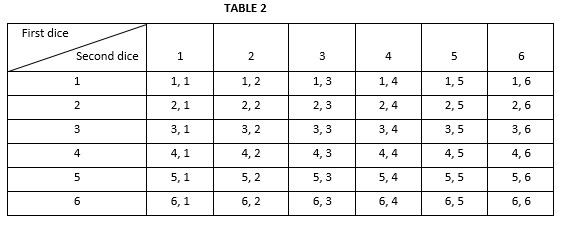When two dice are rolled:
(i) List the outcomes for the event that the total is odd.
(ii) Find probability of getting an odd total.
(iii) List the outcomes for the event that total is less than 5.
(iv) Find the probability of getting a total less than 5?
(i) List the outcomes for the event that the total is odd.
Possible outcomes of two dice are:

Outcomes for the event that the total is odd are: (2, 1), (4, 1), (6, 1), (1, 2), (3, 2), (5, 2), (2, 3), (4, 3), (6, 3), (1, 4), (3, 4), (5, 4), (2, 5), (4, 5), (6, 5), (1, 6), (3, 6), (5, 6)
(ii) Find probability of getting an odd total.
Total numbers of outcomes from two dice are 36
From above we get that the total number of outcomes for the event that the total is odd are 18
Probability of getting an event that the total is odd = ![]()
(iii) List the outcomes for the event that total is less than 5.
Total numbers of outcomes from two dice are 36
Total number of outcomes of the events that total is less than 5 are: (1, 1), (2, 1), (3, 1), (1, 2), (2, 2) and (1, 3)
(iv) Find the probability of getting a total less than 5?
Total numbers of outcomes from two dice are 36
Total number of events that total is less than 5 are: (1, 1), (2, 1), (3, 1), (1, 2), (2, 2) and (1, 3)
Probability of getting an event that total is less than 5 = ![]()
Therefore the probability of getting an event that total is less than 5 is ![]()